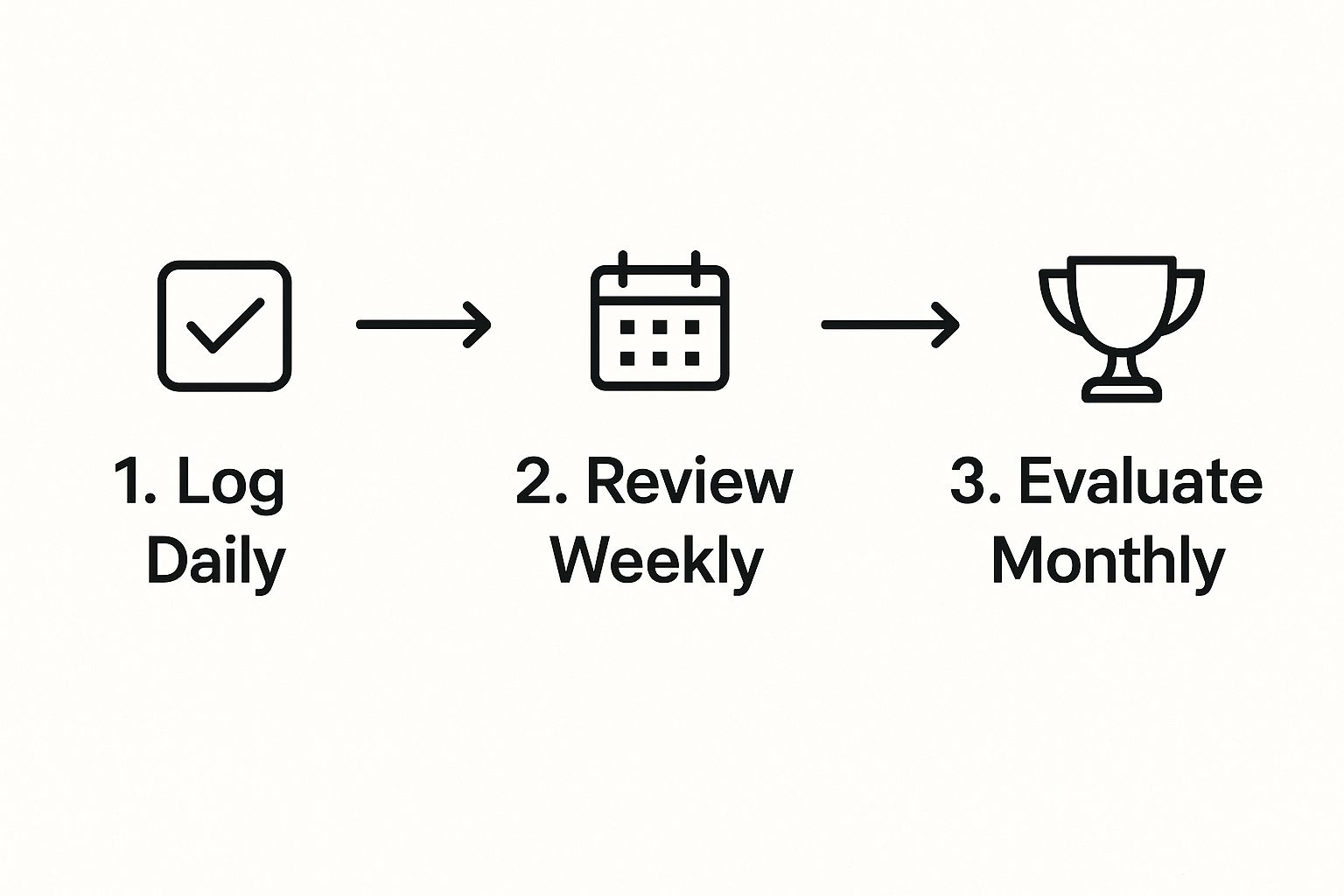How to Improve Self Discipline for Lasting Success
Learn how to improve self discipline with our guide. Discover science-backed strategies and actionable tips to build focus and achieve your goals.
Look, improving self-discipline isn't about some brutal, joyless grind. It's about building a reliable engine inside you—one that keeps running long after the initial jolt of motivation has worn off.
This is the skill that separates a cool idea from a real, functioning business. It's about making the hard choices that align with your big-picture goals, especially on the days you just don't feel like it. Mastering this is how you turn a bold vision into something tangible.
Why Self-Discipline Is Your Ultimate Advantage

For a founder or creator juggling a million things, self-discipline isn’t just some "nice-to-have" personality quirk. It’s your single greatest competitive edge. Talent gets you in the game and motivation might light the initial fire, but discipline is the system that guarantees you keep showing up, day in and day out.
Think of it less as an iron fist and more as your personal operating system. It's the code that boots up and runs your most critical work, even when the thrill of a new project has faded into the background.
And here’s the good news: this ability to self-regulate isn't some gift from the heavens. It's a muscle. You build it over time. Every single time you choose the important, difficult task over the easy distraction, you’re doing another rep. You're building resilience and momentum.
The Science Behind Self-Control
This isn't just founder folklore; it's backed by some serious research. A landmark 2011 longitudinal study tracked over a thousand people from childhood into their thirties, and the results were staggering.
Kids with higher self-control grew up to have significantly better outcomes across the board: higher incomes, better health, and lower rates of substance abuse. In fact, self-control was just as predictive of adult success as IQ and socioeconomic status. You can dig into the full research on its powerful life outcomes yourself.
The takeaway is crystal clear. Working on your self-discipline isn't just about getting more done today. It's a direct investment in your long-term achievement and well-being. It's the engine that will power you through the inevitable setbacks and keep you pointed toward your North Star.
Self-discipline is the bridge between goals and accomplishment. It gives you the freedom to subordinate your feelings and impulses to your long-term vision.
A Framework for Lasting Discipline
To really get a grip on self-discipline, it helps to see it not as one big, scary thing, but as a combination of a few core components. These are the pillars that hold up the entire structure, especially when you're under pressure.
We'll break down each of these throughout this guide, but let's start with a high-level overview.
The Foundational Pillars of Self-Discipline
These four pillars work together to create a system where disciplined action becomes your default setting, not a daily struggle against your own instincts.
| Pillar | What It Means | Why It Matters for Founders |
|---|---|---|
| Clear Vision | Knowing your "why." A compelling North Star that guides your decisions. | Provides intrinsic motivation to push through the inevitable tough times. |
| Robust Systems | Designing routines and environments that automate good decisions. | Reduces reliance on finite willpower, making consistency easier. |
| Resilient Mindset | Overcoming procrastination by managing emotions like fear and overwhelm. | Enables you to take action despite uncertainty and a high workload. |
| Mental Toughness | Systematically expanding your capacity for deep work and focus. | Builds the endurance needed to execute on long-term, complex projects. |
By focusing on these areas, you stop trying to be disciplined and start becoming a disciplined person. It’s a subtle shift, but it makes all the difference. This is how you build a life where disciplined action is simply what you do.
To help you put these ideas into practice right away, we've put together a comprehensive Self-Discipline Blueprint with a ton of actionable steps.
Define Your North Star to Fuel Your Drive

Self-discipline without a clear purpose is like revving a powerful engine while parked. You burn a ton of fuel but go absolutely nowhere.
To build discipline that actually lasts, you need a compelling "why" that pulls you forward, especially on the days when your willpower is running on empty. This is your North Star.
Your North Star isn't some vague wish. It’s a tangible, high-definition vision of the future you're committed to building. It connects the daily grind to a mission that actually means something. Suddenly, working late on your startup or saying no to a distraction doesn't feel like a sacrifice. It feels like a strategic move toward your destination.
This is the ultimate source of intrinsic motivation, turning draining tasks into deliberate, meaningful actions.
From Vague Idea to Tangible Mission
So how do you find this guiding light? It starts by digging deeper than surface-level goals like "make more money" or "be successful." You have to get to your core values and what truly drives you.
A powerful North Star is built on well-defined ambitions. To get there, you first have to understand how to effectively set and reach your professional and personal goals. This process forces you to articulate what matters most, forming the bedrock of your mission.
Try these exercises to get started:
- The 5 Whys: Start with a simple goal, like "I want to grow my business." Now, ask "Why?" five times. Each answer should drill down one level deeper until you hit the core emotional driver. The real reason might be to achieve creative freedom or build something that outlasts you.
- Future-Self Visualization: Close your eyes and vividly imagine your life in five years if you succeed. What does your average day look like? Who are you spending time with? What problems are you solving? Write it all down in meticulous detail.
Anchor Your Daily Actions
Once you've defined your North Star, it becomes a shockingly effective filter for your decisions. Before you commit to a new project or accept a meeting, ask one simple question: "Does this move me closer to my North Star?"
Your North Star is your ultimate filter. It simplifies complex decisions by giving you a clear, unwavering criterion for what's truly important and what's just noise.
This clarity is your anchor in the storm. It transforms abstract goals into a source of daily motivation, making disciplined choices feel less like a chore and more like an investment in the future you are actively creating.
This vision is what will fuel the daily actions and routines needed to build good habits that stick.
Design Systems to Outsmart Willpower Fatigue

Here’s a rookie mistake I see founders make all the time: they try to muscle their way to self-discipline using sheer willpower. It’s like trying to power a factory with a single AA battery. It’s doomed to fail.
The science is clear on this. Willpower is a finite resource. Researchers call it ego depletion—it’s a mental fuel tank that drains with every single decision you make, big or small, all day long.
Instead of fighting this daily energy drain, the most disciplined people I know don't have more willpower. They just need less of it. They build systems that make the right choices the default path.
The real goal isn't to be a hero of self-control. It's to design an operational playbook for your life and work that automates disciplined behavior, keeping you on track even when your motivation hits rock bottom.
Build a Frictionless Environment
Your environment is quietly steering your behavior far more than you think. The trick is to become a "choice architect" for your own life, making it easy to do the right thing and hard to do the wrong thing. This isn't about harsh restrictions; it’s about smart, intentional design.
For instance, if you want to drink more water, don't just hope you'll remember. The moment you sit at your desk, put a full water bottle right next to your keyboard. The friction to take a sip is now zero. Getting a sugary soda? That requires getting up, walking to the kitchen, and making a series of less-ideal choices.
Successful people don't have more willpower; they have better systems. They understand that motivation is unreliable, but a well-designed environment consistently produces the right actions.
You can apply this concept to every corner of your life:
- Your Digital Space: Use an app blocker to automatically shut down social media during your deep work blocks. Suddenly, the friction to mindlessly open Instagram becomes sky-high.
- Your Physical Space: Want to hit the gym before work? Lay out your workout clothes the night before. That one small action removes a key decision point—and a major point of friction—when you're groggy and looking for an excuse at 6 AM.
Automate Your Decisions with Frameworks
Once your environment is working for you, not against you, it's time to install frameworks that take the constant decision-making out of your day. This is how you build powerful routines that eventually run on autopilot.
Habit Stacking
One of the most potent methods I’ve ever used is habit stacking. Instead of trying to bolt on a new habit from scratch, you anchor it to something you already do without thinking. The formula couldn't be simpler: "After [Current Habit], I will [New Habit]."
- "After I pour my morning coffee, I will meditate for five minutes."
- "After I shut my laptop for the day, I will write down my top three priorities for tomorrow."
This clever trick links the new, desired behavior to a well-worn neural pathway, making it feel more natural and automatic much faster.
Time Blocking
For any busy founder or creator, time blocking is non-negotiable. It's the difference between having a vague to-do list and having an executable plan. You assign every minute of your workday to a specific task directly on your calendar.
This transforms your day from a series of open-ended questions ("What should I work on next?") to a clear, actionable roadmap. It's your best defense for deep work, shielding your focus from the endless barrage of distractions.
To push this even further and reclaim more mental energy, look for ways to automate repetitive tasks and simplify your workflows. The less you have to decide, the more you can simply do. When you stop negotiating with yourself and just execute the plan, your capacity for real, sustainable discipline skyrockets.
Master Your Mindset to Defeat Procrastination
Let's get one thing straight: procrastination isn't a character flaw. It's not laziness. It's a sophisticated defense mechanism your brain uses to avoid negative feelings tied to a task—fear, overwhelm, perfectionism, you name it.
To build real self-discipline, you have to win the mental game first. This isn't about brute force. It's about fundamentally changing your relationship with the work. Once you learn to reframe your thoughts and lower the emotional stakes, taking action becomes almost effortless. You're building a mental toolkit to dismantle the urge to delay before it even takes hold.
Tame Your Triggers with Cognitive Reframing
How you see a task is everything. If you look at "write the business plan" as a single, monumental project where any mistake spells doom, of course you're going to avoid it. Your brain is wired to run from threats like that.
Cognitive reframing is the practice of consciously shrinking the threat.
Instead of thinking, "I have to write this entire, perfect business plan," just change the script: "Today, my only job is to outline the executive summary." See what happened? You just swapped a monster for a manageable to-do item, stripping away the anxiety that fuels procrastination.
Procrastination is an emotional regulation problem, not a time management problem. We delay tasks not because we're lazy, but because they make us feel bad. Address the feeling, and you solve the problem.
This tiny shift is incredibly powerful. It lets you sidestep the emotional roadblock and just focus on the immediate, achievable action. Do this consistently, and you'll train your brain to see big challenges as a series of small, non-threatening steps instead of one giant, terrifying leap.
Gain Momentum with the Two-Minute Rule
Often, the hardest part of beating procrastination is just starting. The Two-Minute Rule is a dead-simple, almost stupidly effective hack to break through that initial inertia.
The rule is exactly what it sounds like: whatever you're putting off, commit to doing it for only two minutes.
- Need to tackle your chaotic inbox? Just answer one email. Two minutes.
- Dreading a workout? Just put on your gym clothes and do two minutes of stretching.
- Avoiding sales calls? Just look up the contact info for a single lead.
The magic here is that starting is the bottleneck. Once you begin, Newton's first law often kicks in—an object in motion stays in motion. Those two minutes frequently stretch into ten, then thirty, because the friction of starting has vanished. You're building momentum, which is the ultimate antidote to procrastination.
Fuel Your Drive with Autonomous Motivation
Ultimately, the most sustainable way to crush procrastination is to connect your work to a deeper, internal purpose. This is where autonomous motivation—the drive that comes from within—becomes your ultimate superpower.
It’s the feeling that you are choosing your actions because they align with your own values and goals, not because some external pressure is forcing you.
The science on this is crystal clear. A recent study involving 377 participants found a direct link: higher self-discipline crushes procrastination. But more importantly, it showed that self-discipline also fires up autonomous motivation, which creates a second, powerful pathway to getting things done. You can read the full research on how self-regulation predicts success for yourself.
When you feel in control and believe your work is meaningful, the negative emotions that cause you to delay simply start to fade away. This intrinsic drive transforms dreaded chores into meaningful steps toward your North Star.
Build Mental Toughness with Deliberate Practice
Self-discipline isn’t some magical trait you’re either born with or you’re not. It’s a muscle. And just like any muscle, it gets stronger when you train it with consistent, intentional effort. The secret isn't just grinding away or mindlessly repeating tasks. It's about applying the principles of deliberate practice to systematically build your mental toughness.
This is where you stop hoping for discipline and start training for it. Instead of dodging the hard, uncomfortable stuff, you start hunting for it. You see those dreaded tasks as gym equipment for your brain—opportunities to push your limits in a structured, intelligent way.
Embrace Productive Discomfort
The heart of deliberate practice is learning to love productive discomfort. This is that sweet spot just outside your current comfort zone where real growth actually happens. It’s challenging enough to demand your full, undivided attention, but not so brutal that it leads to burnout.
Think of it like a weightlifter who adds just a little more weight to the bar each week. For a founder, this might mean finally making that difficult sales call you’ve been putting off first thing in the morning. The goal isn't just to check the box; it's to train your brain to handle that initial wave of resistance and come out stronger on the other side.
This reframes your most dreaded chores into a daily training regimen. For a complete guide on weaving this into your daily routine, our Self-Discipline Blueprint lays out a step-by-step plan.
True discipline isn't about being perfect. It's about consistently showing up for the hard reps. Each time you lean into productive discomfort, you're building the mental calluses you need to win in the long run.
How to Apply Deliberate Practice
Putting this concept to work doesn't have to be complicated. You can weave it directly into your work with a few focused strategies to systematically build the resilience needed for high-stakes environments.
Here are a few practical ways to start:
- Practice High-Stakes Conversations. Never "wing" a crucial investor pitch or a tough feedback session with a team member. Role-play it. Practice your key talking points out loud until they feel second nature. This doesn’t just build your skill; it forges your confidence for when the pressure is on.
- Seek and Analyze Feedback. The most disciplined performers are feedback junkies. After a major project or presentation, don't just move on to the next fire. Actively ask for specific, critical feedback. What worked? What fell flat? This gives you a precise roadmap for where to focus your next training session.
- Systematically Push Your Limits. If you can only manage 30 minutes of deep focus now, don't just accept it as your limit. Tomorrow, push for 35. The day after, aim for 40. This incremental approach gradually expands your capacity for deep work, turning discipline from an abstract idea into a measurable skill you can improve over time.
Putting It All Together with the Self-Discipline Blueprint
Alright, we’ve covered a lot of ground—from nailing down your North Star to forging real mental toughness. But ideas without action are just that: ideas. The real magic happens when you move from theory to daily execution.
This isn't about finding a sudden surge of willpower. It's about building a solid, repeatable system that weaves these strategies directly into your routine. True self-discipline isn't a one-time decision; it's a flywheel you get spinning, day after day.
Here's a simple way to visualize how that flywheel builds momentum.

Think about it: logging your daily actions, reviewing weekly progress, and checking in on monthly outcomes. This isn't just tracking; it’s a powerful feedback loop that drives continuous improvement and keeps you honest.
To help you build this system from scratch, we've laid out the exact steps. Our Self-Discipline Blueprint is your operational playbook. It's packed with detailed checklists, daily practices, and a review process designed to make discipline your default setting.
Your Toughest Questions, Answered
Look, even with the best game plan, the path to real self-discipline is littered with questions and moments of doubt. It's part of the process. Let's tackle some of the most common hurdles you'll face so you can keep your momentum when things get tough.
How Long Does This Actually Take?
Everyone wants a magic number, but there isn’t one. Building discipline is a gradual rewiring of your brain, and it's different for everyone.
Some habit research points to as little as 18 days to get a new behavior going. But other studies, probably more realistically, show it can take up to 254 days for a habit to become truly automatic—something you do without even thinking.
The real key isn't speed; it’s consistency. Forget about instant perfection. Just focus on stringing together small, daily wins and building a system you can rely on. Aim for progress, not a finish line.
What if I Have a Bad Day and Screw Up?
First, welcome to the club. A single bad day doesn’t erase all your hard work. This is probably the most critical mindset shift you can make.
The most disciplined people I know aren't perfect robots. They just get back on track faster than anyone else.
Don't fall for the "all-or-nothing" lie. One slip-up doesn't mean the entire day, week, or goal is shot.
Instead of beating yourself up, treat it as pure data. Get curious. Ask yourself:
- What actually triggered this?
- Was I just exhausted? Stressed? Or was there a flaw in my system?
Use that insight to make a small adjustment, then get right back to it tomorrow. A fresh start is always just one sleep away.
Is It Possible to Have Too Much Self-Discipline?
Absolutely. If your discipline leads to burnout, makes you rigid and inflexible, or sucks all the joy out of your life, you've gone too far.
Healthy self-discipline should feel like freedom—it aligns what you do every day with what you truly value. It should not feel like a prison of rules you've built for yourself.
The goal here is to be sustainably effective, not just relentlessly productive. It’s absolutely vital to balance your focused work with real rest, a bit of spontaneity, and the ability to adapt when life inevitably throws you a curveball.
Sprint Smarter. Forecast Every Week.
Log wins. Build momentum. Let AI show you if you're on track to hit your sprint goal—before it's too late.
Join the waitlist and be the first to unlock predictive clarity for your team.